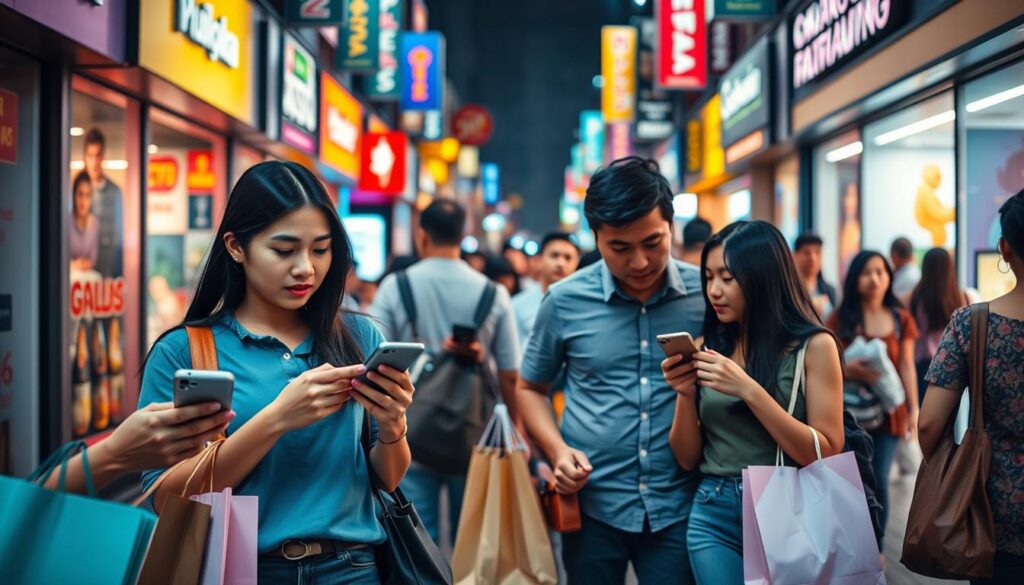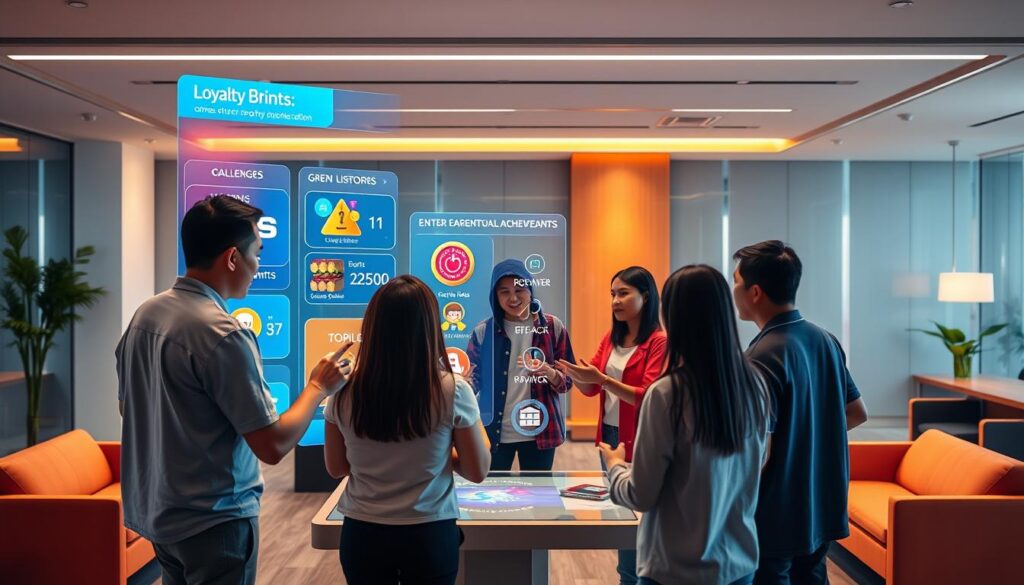As we near 2025, businesses wonder if old loyalty programs still work. Technology is changing fast, and what customers want is changing too. This article will look at new trends in customer loyalty, focusing on the Philippines. We’ll see how businesses can keep up with tomorrow’s smart shoppers.
Key Takeaways
- Understanding the shifting landscape of customer loyalty is crucial for businesses.
- Personalization is increasingly becoming the cornerstone of effective loyalty programs.
- Technology plays a vital role in facilitating enhanced customer retention & loyalty.
- Instant rewards and gamification will engage customers in innovative ways.
- Strategic brand partnerships can maximize value for customers.
The Evolving Landscape of Customer Loyalty
The world of customer loyalty is changing fast. Businesses now focus more on building emotional bonds than just selling. This shift is seen in 84% of companies, following new trends in customer engagement. In the Philippines, Jollibee and Sephora are leading the way by offering more personalized experiences.
These brands are moving beyond just discounts and promotions. They aim to give customers more value through tailored experiences.
Businesses face big challenges in keeping customers loyal. With 83% of brands struggling to keep customers, it’s time to rethink loyalty programs. Companies must find a way to use customer data wisely while respecting privacy.
Today, customers want to know how their data is used. This makes it important for brands to be open and responsible with data.
Understanding these changes is crucial for businesses. They need to focus on building connections while being careful with customer data. This approach will help them stay competitive in the market.
Key Drivers of Change in Customer Behavior
The world of customer loyalty is changing fast. Economic factors are a big reason, as people look for value in what they buy. Brands are now focusing on what makes customers loyal, changing how they operate.
Social awareness is also playing a big part. People want to support brands that share their values. They look for honesty and fairness in business. This makes companies that care about social issues more loyal to their customers.
Technology is another key factor. New digital tools help engage customers and make experiences more personal. But, there’s a challenge in keeping data safe while still offering great experiences. About 40% of marketers find it hard to balance these needs. They need new ways to make loyalty programs that fit today’s world.

Personalization: The Heart of Future Loyalty Programs
Personalization is changing how brands talk to their customers. Now, over 58% of companies focus on making interactions special. They use customer data to offer things that match what each person likes.
Today, people want brands to know and meet their unique needs. This has made loyalty programs more personal. Companies are using AI to understand what customers want. This helps them create experiences that build strong bonds and loyalty.
Good loyalty programs keep customers coming back and make the brand better. Brands that get personalization right make customers happier. They use data to make sure what they offer is what customers want.
Brands that think ahead are making loyalty programs better. They focus on building emotional connections through personal touches. This makes customers more engaged and happy.
| Aspect | Traditional Programs | Personalized Programs |
|---|---|---|
| Customer Engagement | Generic rewards | Tailored incentives based on preferences |
| Data Utilization | Basic demographics | In-depth behavior analysis |
| Customer Retention | Standard offers | Customized recommendations |
| Emotional Connection | Minimal interaction | Deep personal engagement |
For companies wanting to stay ahead, personalizing loyalty programs is key. It leads to better experiences and stronger loyalty. Learn more about this shift in in-depth resources.
Customer Retention & Loyalty Strategies for 2025
The retail world is changing fast. Brands are focusing on new ways to keep customers coming back. About 67% of businesses are using tiered loyalty programs. This method encourages customers to get involved and builds a stronger bond with the brand.
Creating emotional connections is key to loyalty. Customers like brands that share their values and interests. By offering rewards that match what customers want, companies can make lasting memories.
Businesses need to understand what customers want and like. They can use surveys or feedback to learn what makes customers happy. This information helps them create offers that are just right for each customer.
| Strategy Type | Description | Expected Result |
|---|---|---|
| Tiered Loyalty Programs | A multi-level program rewarding customers based on their spending or engagement. | Increased customer retention through enhanced engagement. |
| Personalized Rewards | Rewards tailored to individual customer preferences and behaviors. | Stronger emotional connections and satisfaction. |
| Feedback Mechanisms | Surveys and feedback loops to understand customer needs. | Improved offerings and relevance of loyalty programs. |

The Rise of Instant Rewards and Real-Time Benefits
Today, shoppers want instant rewards when they buy things. Brands are listening, with 75% focusing on giving rewards right away. This meets the needs of today’s fast-paced customers, who don’t like waiting for rewards.
Retailers can make shopping better by offering discounts right when you buy or through apps. These quick rewards make customers happy and loyal. When rewards are part of the buying process, it makes customers want to come back.
| Feature | Instant Rewards | Traditional Rewards |
|---|---|---|
| Speed of Reward Access | Immediate | Delayed |
| Consumer Engagement | High | Moderate |
| Loyalty Retention | Increased | Lower |
| Program Flexibility | Dynamic | Fixed |
The world of customer loyalty is changing fast. Real-time benefits will be key to success. Brands that offer instant rewards will keep customers coming back. This way, they stay ahead in a fast-changing market.
Gamification: Engaging Customers in New Ways
Gamification in loyalty programs adds a fun twist to old reward systems. It uses game-like elements to keep customers interested. This approach is very effective, with 65% of brands seeing it boost engagement.
These programs offer more than just rewards. They include challenges and games to keep customers engaged. This makes customers excited to participate and connect with the brand.
Top companies use gamification to make memorable interactions. Instead of just earning points, customers get to enjoy dynamic experiences. This not only keeps customers loyal but also strengthens the brand-consumer relationship.

Brand Partnerships: Maximizing Value for Customers
Strategic brand partnerships are key for businesses wanting to improve their customer offers. Research shows 84% of companies want to work with other brands. These partnerships help create collaborative loyalty initiatives that offer special rewards. This makes loyalty programs more appealing to customers.
Brands use cross-brand rewards to team up on promotions or events. This approach can attract more people and keep customers engaged. Today, people want a variety of rewards that make their loyalty journey easier. So, combining different loyalty programs can give a smooth experience for everyone.
| Brand Partnership | Type of Reward | Target Benefit |
|---|---|---|
| Starbucks & Spotify | Exclusive music playlists | Enhanced customer experience |
| AirAsia & Ensure | Discounted wellness products | Health-focused benefits |
| SM Mall & Mastercard | Cashback offers | Financial incentives for shoppers |
| Grab & Watsons | Cross-promotion discounts | Broader engagement opportunities |
Through these strategic partnerships, brands can offer more value to their customers. This approach makes loyalty programs more exciting and engaging. In today’s fast-changing world, brand partnerships are crucial for better customer experiences.
The Role of AI and Technology in Enhancing Loyalty
AI in loyalty programs is changing the game for brands wanting to better customer experiences. Now, 62% of companies are investing in this area. This shows the growing benefits of using technology to keep customers coming back.
Businesses use machine learning to deeply analyze customer data. This helps them create personalized interactions that match what each customer likes.

Brands using AI to tailor their loyalty programs make smarter choices. This approach boosts loyalty and satisfaction. It also leads to more repeat business.
Brands can address privacy worries by protecting customer data well. Yet, they still get to use smart analytics to their advantage.
“AI can predict customer needs and preferences, allowing businesses to foster long-term loyalty.”
Technology in customer retention combines automation with a personal touch. This makes customers feel appreciated. For more on using AI, check out this resource.
By embracing these innovations, brands can make their loyalty programs better. They can create journeys that really speak to each customer’s interests and actions.
Sustainability and Ethical Practices in Loyalty Programs
More and more people care about the planet, and brands are taking notice. About 52% of companies are adding eco-friendly steps to their loyalty programs. This move not only helps the environment but also wins over customers who want to do good.
Take Costa Coffee, for example. They reward customers for choosing sustainable options, like using reusable cups. These rewards don’t just keep customers coming back. They also build a sense of community and shared goals.
Brands that make sustainability a part of their loyalty programs build strong bonds with their customers. This approach fits with the growing demand for eco-aware and ethical shopping. Companies that get this right earn the trust of their customers, leading to lasting loyalty.
Conclusion
Looking ahead, several key trends are shaping the future of customer loyalty. Personalization is becoming more important, turning casual shoppers into loyal customers. Businesses that use consumer data well will stand out, connecting more with their audience.
The need for instant rewards is changing loyalty programs. Customers want quick rewards, not waiting. This means loyalty programs need to offer fast rewards to keep customers engaged.
Also, ethical practices are becoming more important. Companies that focus on sustainability and responsible business will attract eco-conscious consumers. This builds a strong bond with customers, crucial in today’s competitive market.

